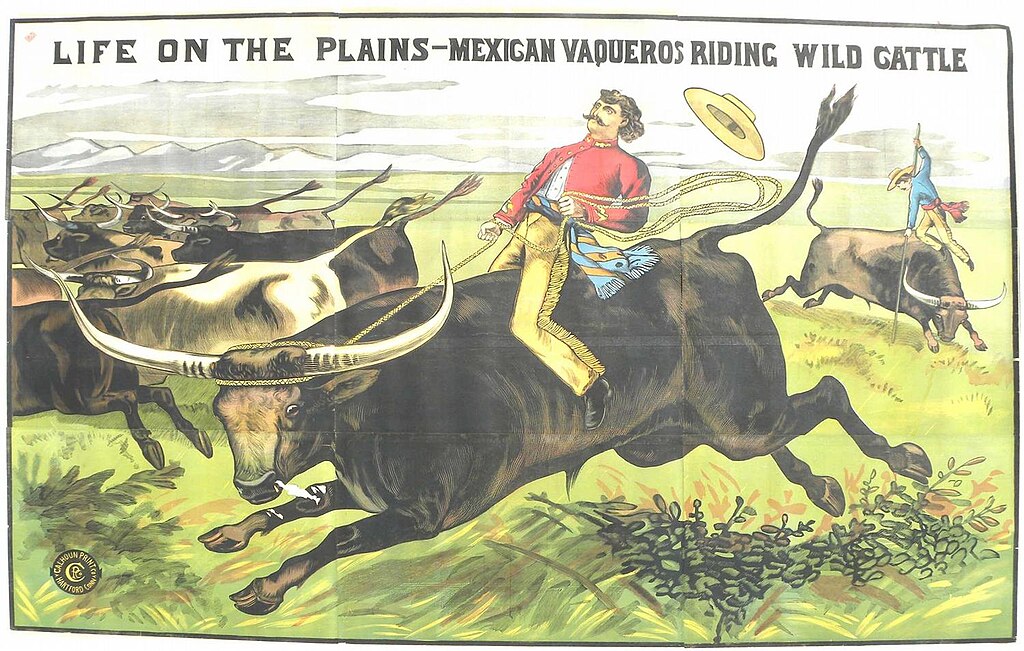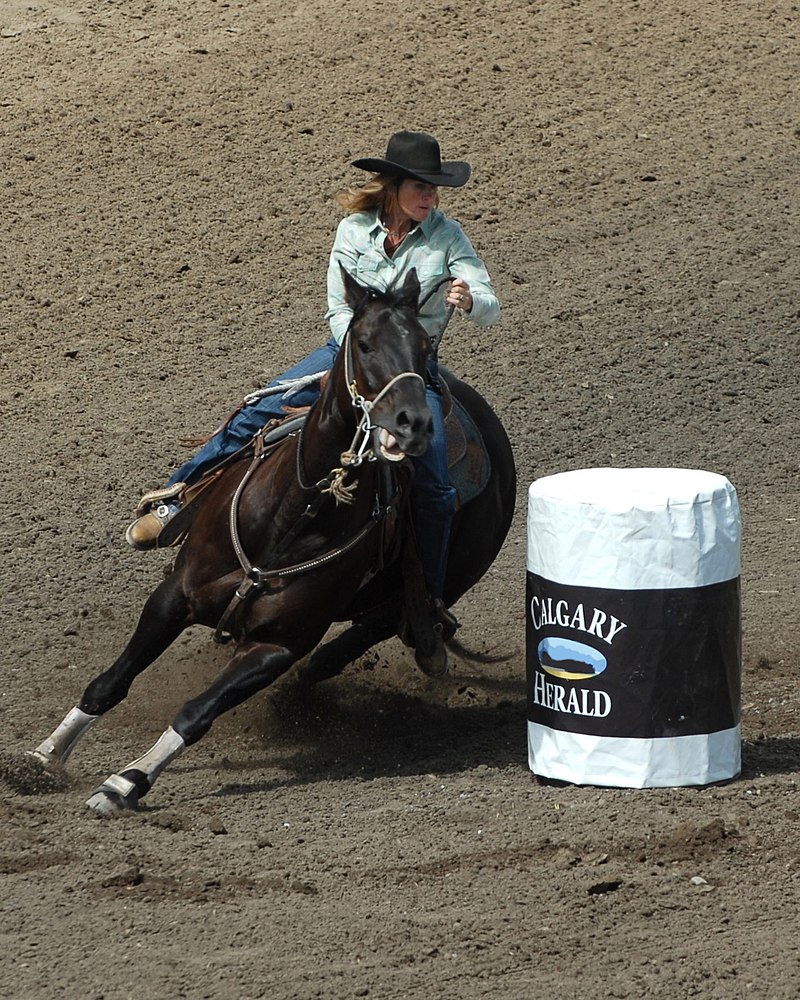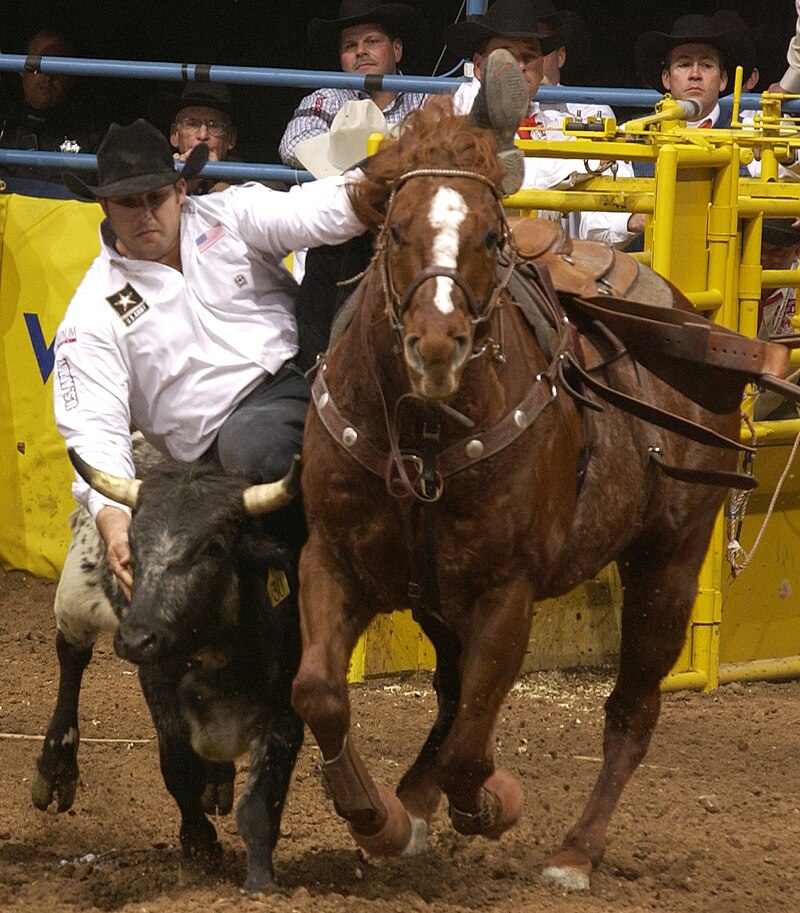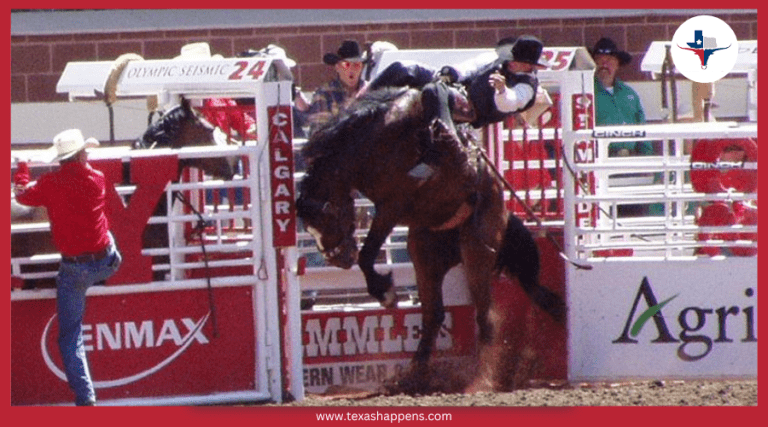anonymous, StampedeRodeo2002, CC BY-SA 3.0
Rodeo, a thrilling display of cowboy prowess, was officially designated as Texas’s state sport on June 18, 1997, through Texas House Concurrent Resolution No. 6. This decision by the 75th Legislature wasn’t just about recognizing rodeo as a sport; it was about acknowledging its deep roots in Texas’s culture and history.
When you attend a rodeo, you’re not just witnessing a sport; you’re experiencing a representation of state pride. The events, such as bareback riding, steer wrestling, and bull riding, showcase traditional cowboy skills that have been passed down through generations. This designation also supports Texas’s commitment to preserving its rich equestrian culture. The recognition of the Ghostriders as the official state rodeo drill team in 2007 further underscores the importance of this cultural heritage.
Origins of Rodeo
How did the exhilarating sport of rodeo come to life? It all started with cowboy traditions during cattle roundups, where cowboys would gather to showcase their herding skills. These informal competitions highlighted bravery, skill, and the adventurous spirit synonymous with the cowboy lifestyle. The origins of these skills can be traced back to the vaqueros, who were instrumental in shaping the ranching practices in America. Over time, these gatherings evolved into more structured events.
- Pecos, Texas, 1883: The inaugural recorded rodeo took place here, marking a historic moment by formally recognizing the competitive nature of these cowboy gatherings.
- Post-Civil War Ranching Boom: With the expansion of ranching in Texas, the need for skilled cowboys grew. Rodeo events began to reflect and formalize the fundamental skills needed for cattle management.
- 1945 Houston Milestone: The establishment of the Rodeo Cowboys Association in Houston was a crucial step in organizing and standardizing rodeo events, ensuring that the sport maintained its integrity and appeal.

Development of Rodeo Events
Building on its rich origins, the sport of rodeo has evolved into a dynamic showcase of skill and competition. What began as crucial skills for frontier cowboys during cattle herding has transformed into exciting events that attract participants and audiences alike. The initial recorded rodeo in Pecos, Texas, in 1883 set the stage for organized competitions, highlighting the cowboys’ abilities.
With the establishment of the Rodeo Association of America in 1929, rodeo rules became standardized, ensuring a more organized and fair competition. This standardization also paved the way for implementing safety regulations and focusing on animal welfare, which are crucial aspects of modern rodeo. Major rodeos, like the Houston Livestock Show and Rodeo and the Fort Worth Stock Show & Rodeo, continue to celebrate these traditional events.
Notable Rodeo Competitions
In the world of rodeo, Texas stands out with its array of notable competitions that draw enthusiasts from all corners. These events not only highlight the state’s deep-rooted rodeo traditions but also feature impressive livestock exhibitions that showcase the best in the industry.
Here’s a closer look at some of the premier rodeo competitions in Texas:
- Fort Worth Stock Show & Rodeo: Scheduled for January 12 – February 3, 2024, this event is one of Texas’s largest. It offers a variety of rodeo competitions and extensive livestock exhibitions, drawing crowds keen to witness the talents of both cowboys and animals.
- San Antonio Stock Show & Rodeo: Taking place from February 8-25, 2024, it features top competitors and is renowned for its significant contributions to scholarships and community programs, blending rodeo excitement with philanthropy.
- Houston Livestock Show and Rodeo: Running from February 27 – March 17, 2024, it stands as the world’s largest livestock exhibition, combining an expansive lineup of rodeo events and concerts, making it a can’t-miss spectacle.
These events celebrate the spirit of rodeo and uphold Texas’s enduring legacy in this thrilling sport.
Economic Impact of Rodeo
While the thrill and tradition of rodeo competitions captivate audiences, it’s important to recognize their considerable impact on local economies. The Houston Livestock Show and Rodeo alone generates over $400 million annually, fueling the local economy. You’ll find that cities like Fort Worth and San Antonio benefit immensely from these events, with millions of visitors enhancing tourism growth and pouring revenue into hotels, restaurants, and shops.
Rodeo events do more than just entertain; they create sponsorship opportunities that bring supplementary funding and attention to the hosting cities. For instance, the Fort Worth Stock Show & Rodeo contributes approximately $200 million each year, supporting local businesses and creating jobs.
Rodeo’s Cultural Significance
Deeply woven into the fabric of Texas heritage, the rodeo’s cultural significance can’t be overstated. It’s more than just a sport; it’s a celebration of rodeo traditions and cowboy values that have shaped the Lone Star State. When you attend a rodeo, you’re not just witnessing an event; you’re experiencing a crucial part of Texas’s identity. Here’s why it matters:
- Preservation of Skills: The rodeo showcases traditional cowboy skills like roping and riding, keeping these vital techniques alive and relevant. It’s a living history lesson, reflecting the early cattle industry’s demands on the Texas frontier.
- Community Bonding: Rodeo events serve as a focal point for community identity and pride. They bring together a diverse range of people, creating a sense of unity and belonging among participants and spectators alike. You’re not just watching a competition; you’re part of a larger community celebration.
- Promotion of Values: The sport embodies cowboy values such as independence, courage, and teamwork. These traits are integral to the Texas cultural narrative, promoting a spirit of resilience and camaraderie in every event.
Contributions of Women in Rodeo
Women have markedly shaped the landscape of rodeo, breaking barriers and pushing for greater recognition in a male-dominated sport. You can trace the roots of female participation back to the formation of the Women’s Professional Rodeo Association in San Angelo, a crucial moment that showcased women’s talents.
Female rodeo pioneers like Barbara Inez Tad Lucas played a critical role in this evolution. Her fame and skills brought much-needed visibility to women’s contributions.
Consider the impact of women’s involvement through these points:
- Recognition: The National Cowgirl Hall of Fame honors female competitors, celebrating their influence on the sport and its history.
- Evolution: Women’s rodeo events like barrel racing and breakaway roping have developed, offering more opportunities for female athletes.
- Inclusion: Women’s presence in rodeo has diversified the sport, fostering greater acceptance and inclusion within the community.

Rodeo and Community Identity
Rodeo stands as a lively symbol of Texas’s cultural heritage, intertwining cowboy traditions with community spirit. When you attend a rodeo, you’re not just watching a series of thrilling events; you’re participating in a deeply rooted cultural phenomenon that reflects the state’s rich cowboy heritage.
Major events like the Houston Livestock Show and Rodeo or the Fort Worth Stock Show & Rodeo attract thousands, creating a dynamic atmosphere where community celebrations come to life. You’ll find families and friends gathering to support local competitors, sharing in the excitement of traditional cowboy skills.
Moreover, the rodeo’s integration into Texas culture markedly increases tourism, drawing visitors’ enthusiasm to experience these vibrant events. Organizations like the Professional Rodeo Cowboys Association (PRCA) amplify these efforts, promoting rodeo culture and providing platforms for cowboys to showcase their skills.

Rodeo’s Global Influence
As you experience the lively community spirit at a Texas rodeo, it’s fascinating to recognize how these cowboy traditions have reached beyond state lines, capturing the imagination of audiences worldwide. From Canada to Australia, Brazil to Mexico, the international rodeo scene thrives, reflecting the universal appeal of these exhilarating events. The Professional Rodeo Cowboys Association (PRCA) has played a crucial role in strengthening these global ties, promoting rodeo events, and fostering a worldwide community of enthusiasts.
Rodeo Events and Skills
Rodeo competitions highlight the abilities of both cowboys and cowgirls, as well as their animals. Here are some of the main events that make up a rodeo:
1. Bull Riding
One of the most popular and adrenaline-packed events, bull riding requires riders to stay mounted on a bucking bull for eight seconds without being thrown off.
2. Saddle Bronc and Bareback Riding
These events showcase a rider’s ability to control and stay on a bucking horse, emphasizing balance, technique, and strength.
3. Barrel Racing
In this timed event, riders race their horses around a series of barrels in a cloverleaf pattern. It is a test of speed, agility, and precision, often dominated by female competitors.
4. Steer Wrestling
Also known as bulldogging, this event involves a cowboy leaping from his horse onto a steer to wrestle it to the ground as quickly as possible.
5. Team Roping
Two cowboys work together to rope a steer—one roping its horns and the other roping its hind legs. This event requires impeccable teamwork and timing.
6. Tie-Down Roping
This traditional event harks back to ranch work, with cowboys roping a calf and tying its legs together in the shortest time possible.
Texas Rodeo Today
Major Events
Texas hosts some of the biggest and most prestigious rodeos in the world, including:
- Houston Livestock Show and Rodeo: The largest rodeo in the world, featuring top-tier competitors, live music, and family-friendly activities.
- San Antonio Stock Show & Rodeo: Known for its competitive events and entertainment.
- Fort Worth Stock Show & Rodeo: A historic event that showcases the tradition of rodeo in Texas.
Community Rodeos
In addition to large-scale events, smaller rodeos take place in towns across Texas, offering a chance for local talent to shine and communities to celebrate their heritage.
Wrapping Up
Rodeo is far more than just a sport—it’s a symbol of Texas’ identity and heritage. By blending athleticism, history, and community spirit, it continues to capture the hearts of Texans and visitors alike. Declaring rodeo the official state sport honors the cowboy culture and ranching traditions that have shaped Texas into the state it is today.


